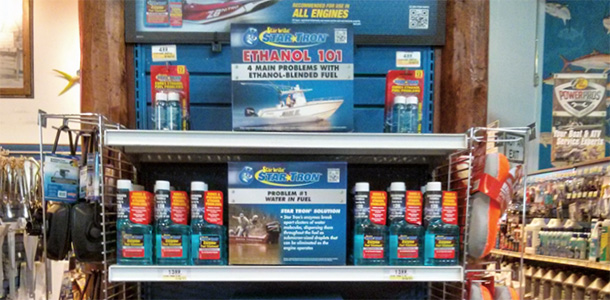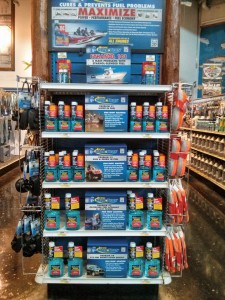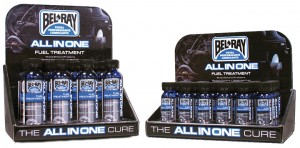Solvent solutions

Manufacturers create products and standards for fuel additives
The presence of ethanol in fuel has influenced much of what the fuel additives market has chosen to offer its customers, and it is important for the whole industry to play ball and make sure consumers are buying the right products to provide the right solutions.
In order for the consumer to be educated, the dealer must diligently educate him or herself on the additives sold in the dealership.
Jim Self, general manager, marine division at Bel-Ray Company, LLC, said dealers should be asking manufacturers how their additives specifically treat ethanol fuels. What does the additive do to prevent phase separation, corrosion and damage to the fuel systems? Does it solve for added water? How long will it keep the fuel fresh and stabilized?
“There is such a wide array out there, with a lot of them making claims that may or may not actually be true, particularly in the marine environment,” Self said. He added that dealers should be wary of additive manufacturers making claims that are scientifically impossible.
“Some have claimed to prevent phase separation [and] I’ve heard people say that some fuel additives will reverse phase
separation. Both of those, from what I’ve been told from our chemist, [are] impossible,” said Self. “You can help neutralize and slow down the effects of ethanol, which leads to phase separation, but there’s nothing that can completely prevent it and there’s nothing that can reverse the effects once it’s occurred.”

Luckily, the National Marine Manufacturers Association is working on a certification program that would provide a standard for fuel additives. It aims to ensure products are protecting engines and consumers and do what they say they will do.
“The consumers and the engine manufacturers want to be assured that any product that they put in their engine will do what it says it does and it does not harm the engine, but protects the engine. We want the consumers to be happy boaters and this is one way to do that,” said Thomas J. Marhevko, vice president of the Engineering Standards Department at NMMA.
Dave Grochocki, vice president of operations at ValvTect, sees a direct need for certification in the fuel additives market.
“Some of the OEMs were having problems with the additive actually causing the problems with the engines because they were putting stuff into the additives – different materials and components – that were really not a good fix for the gasoline problems,” said Grochocki
The NMMA originally expected the program to be complete and available to the industry this summer, but with new work on the alternative technologies fuel additives test program the NMMA is developing, the introduction could be delayed. The Fuel Additives Subcommittee has already defined the characteristics of the additives the NMMA will be testing and has identified the tests to be a part of the program, but work continues on a product approval system.
Greg Dornau, executive vice president of Star brite, is glad to see the program be temporarily delayed because he believes the direction of the NMMA’s certification program was incorrect. Dornau’s opinion is that, rather than addressing the problems marine engines are facing in real world applications and determining what a fuel additive should protect against, the NMMA has turned over control of the committee to a group of large fuel additive manufacturers who all use the same chemical technologies and the NMMA allowed them to develop a testing protocol that was meant to highlight their products.
“The tests selected, which were developed to test raw fuel at the refinery level, have no correlation to what a boater will put into his tank,” said Dornau. “We feel that this certification program is a long way from providing any true benefits to the boater and we are hoping the NMMA will not allow the project to be fast tracked just for the sake of it getting done.”
It is important to get the program right because standardization improves the industry but is also vital to keeping customers in boating. If an engine fails because an additive causes a problem, that boater may be wary about buying fuel additives in the future, causing more problems and possibly leading the customer to get out of the recreation altogether.
“All that does is put a bad taste in the consumer’s mouth. He thinks ‘Do I really need this?’ I think that’s why they’re trying to standardize it so that in order for you to say it’s a gasoline additive that does this, this and this, it has to pass these criteria tests,” Grochocki said.
In the meantime, dealers should ask additive manufacturers for the specific product’s Material Safety Data Sheet (MSDS), which every manufacturer is required to have and will list any hazardous or potentially hazardous ingredients. This is particularly important when looking at additives for treating ethanol fuel. Dornau says there are several additive manufacturers that use alcohol as a base in their additives, which is often listed by non-descript names such as mono glycol ether.
“In the old days prior to ethanol and prior to E-10, we all as manufacturers had alcohol-based fuel additives that were there to absorb the small amounts of water you would find in your fuel. They were safe for the engine and they worked great in a non-ethanol environment,” said Dornau. “We, as a company, have discontinued all of those products because to us, in ethanol, all you’re doing with these additives is making E-10 [become] E-11.”
The biggest key for any dealer is to be vigilant and stay informed about the products so they can become an expert for the customer, and to look at the market to see which products have consistently been top sellers for years. The mentality that the product is “just” a fuel additive is not wise, as the product is going into an engine that is incredibly valuable.
“It’s all about educating the dealer and the consumer, and I put them together because an educated dealer is going to be able to talk to the consumer and give him sound information,” said Dornau. “The dealer needs to become an expert. He needs to spend time talking to the manufacturers, going to these websites and getting trained on how their product works.”
Multi-purpose products
As the boating industry works to offer value products at affordable prices for new boaters, part of the equation is making sure customers are not paying too much for too many products. That was the incentive behind the creation of Bel-Ray’s All in One Fuel Treatment, which was chosen as a Boating Industry Top Product for 2015.
The product was developed after several customer requests for a product that assists the extended storage of fuel with ethanol added, with the bonus of using one product to solve many issues.
“It’s going to make their engines a lot more reliable,” said Self. “Some of the products available in the marketplace right now … you have to have a fuel stabilizer [and] a separate ethanol treatment. If you want an octane booster, that’s another additive. [All in One Fuel Treatment] contains all of them.”

Similarly, ValvTect has recently released its Bio Guard Plus 6, which is a multi-functional pesticide. The idea came from hearing boaters at boat shows discuss using a biocide as well as a multi-functional diesel additive, and ValvTect decided it would be better for the consumer to offer both in one bottle.
The pesticide is an EPA-registered biocide with all of the attributes of a multi-purpose diesel additive: a stabilizer, cetane improver, lubricity improver and more.
“Typically, diesel boaters use biocides to keep bacteria [inherent to the fuel] out of their tanks. Most diesel boaters also, because of the instability of diesel fuel, use another diesel additive also. … What we’ve done is combined a biocide and all of those other things into one bottle,” said Grochocki. “This way, instead of having to buy two products at twice as much money, you can buy one product and that covers all your needs, and the people get a much better fuel for their money. It’s the same exact product that we put into our ValvTect marine diesel fuel.”
Star brite also released its Ring Clean Plus this year, which combines traditional additive technology with some of the leading fuel additive raw material suppliers, said Dornau. The product is designed to attack carbon and other fuel-related deposits while also using the enzymes found in Star Tron so consumers get the company’s flagship product’s benefits.
This genre of product has been on the market for some time but is expensive to produce, said Dornau. He said that, because Star brite is a prime manufacturer, the company has made this product more affordable.
“We were able to bring that top-quality component in at a much more reasonable price point. We think the market is going to respond well — they’re going to have an affordable fuel additive that’s going to give the benefits of Star Tron plus clean up those really hardcore carbon deposits,” said Dornau. “The entire recreational boating industry lives and dies by the number of days our customers get to spend on the water. … A good value product will encourage more use of the product while freeing up the boating budget to spend on fuel.”




